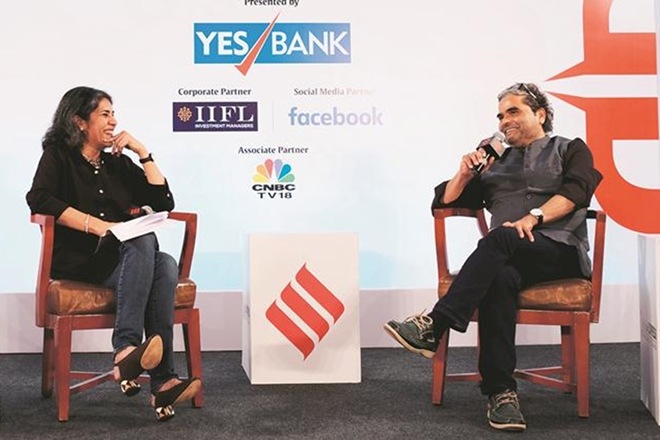On finding good music outside Bollywood in the 80s
Bollywood is such a big shark that it eats up everything. You don’t get non-Bollywood music because we’re blood brothers with Bollywood and that’s both a good and a bad thing. Real popularity is actually only achieved through Bollywood music. Whenever Bollywood music goes down, parallel music comes up. In the ’90s when Rahman came, he brought in a new sound. Before that the songs we were producing in the ’80s were like Tamma tamma loge and Jab tak rahega samose mein aloo. We sunk, as much as we could, into the dirt. The biggest payback of that was that we got Jagjit Singh. He had been struggling in Bollywood for 30 years. When film music went down, Jagjitji came out with Baat niklegi toh door talak jayegi… which became an anthem for the youth of that time.
From making music to making films
I was introduced in Maachis as a music composer. Overnight, I became a star. From taking autos, I graduated to a Ford in two days. And when success comes, you know what they say, ‘sar kandhe par nahi rehta hai’. That’s what happened with me too. Once I was successful, I started questioning the directors of my films on the stories they were telling. I was raising genuine questions with an honest intention but it offended many people. I did only five to six films after that — Satya, Hu Tu Tu, Chachi 420 among others, and my career started going down. So, that’s when I started self-learning and Gulzar saab gave
me confidence. He told me to start learning scriptwriting so that I could develop stories.
On quiet filmmaking and Tarantino
If you see the current political scenario, you have to be quiet. I think (Krzysztof) Kieslowski was a great filmmaker. The beautiful thing about his filmmaking and his writing was that he would find extraordinary conflicts in very ordinary lives. Till my last film, I didn’t have the courage to attempt such a quiet film where the conflict is so strong that even if the characters aren’t speaking and the film is very silent, you are on the edge of your seat. I’ve tried it in small segments, like in Haider, when he is searching for his father.
I have enjoyed all of (Quentin) Tarantino’s films barring the last one, The Hateful Eight. He only makes films that revolve around gangsters and I, too, really like to make films on gangsters. I’m a fan of his work. I tried those things in my own way, in my own language, in my own style in Kaminey.
On finding Shakespeare late
I hated Shakespeare in school. When I try and remember the first thing about Shakespeare, my memory goes back to ‘the pound of flesh’ (from The Merchant of Venice). Baat aai-gai ho gayi, phir kabhi Shakespeare se mulaqat nahin hui. My godson was studying in Dehradun and once we were taking the train back to Delhi. I was bored, so I asked him if he had a book with him. He gave me Lambs’ abridged version of Shakespeare. And the first story I read was Macbeth. And it was so good… mere hosh udd gaye, ki yeh kis tarah ki kahaani hai. At that time I was looking for a story set in the underworld but I needed a story that had depth, that had layers. And I thought this is my story! As soon as I reached Mumbai, I read Macbeth and all other plays of Shakespeare. Aur phir shayad purane janam ka rishta hoga Shakespeare se (Perhaps I have a connection with Shakespeare from our previous births), and then we started writing Maqbool. Now I can live my life in Shakespeare.


On drawing characters from his milieu
Langda Tyagi (in Omkara), was a student called Rathi and he limped, so he was called Langda Rathi. He was a dada, a gunda and a student (in Meerut). Jo bhi Omkara mein tha, I had seen all those characters in real life, I had seen those street fights. I had seen those ganglords and wars. The character of Naseer saab in it — Bhaisaab, the politician — there was a gangster in Meerut like that. When I went back (to Meerut) in 2005, things were the same, rather worse. And then I came to know that Rathi had became a professor, so I thought then I can become a filmmaker too.
On what stops Bollywood from speaking up
There is a psychosis of fear, that if you say something, you will be personally targeted. We have seen that, your community has seen that — Gauri Lankesh was targeted. Second, it’s our bread and butter. For you, it can be just entertainment. But for us, it’s our livelihood. If we have spent Rs 40 crore on a film and then, one week or three days before, you start an agitation, the cost becomes Rs 140 crore before the film is released. They hit you where it hurts the most.
We have never felt like this before. I am not saying that I liked the previous government or that I prefer one party over the other. We have seen genocide by both the governments. I was in Hindu College when the 1984 riots happened. But how easily did we forget about them. As artistes, we take no sides. We take the side of what’s right and that’s why I have always said that one who is not left is not right.

